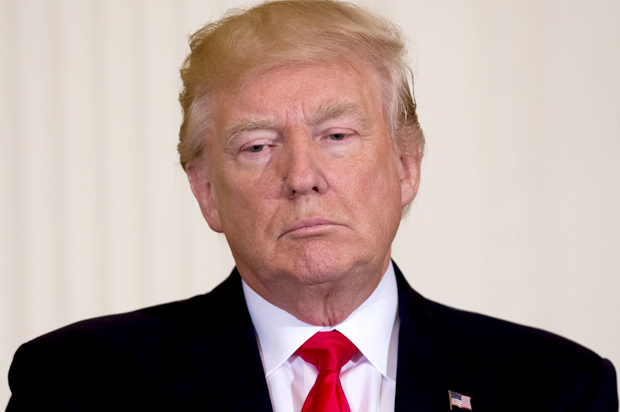Donald Trump reached the height of his popularity right before he became president in January. Ever since then, his poll numbers have been moving steadily downward. Even in late December Trump still was not viewed favorably by a majority of Americans, according to polling averages.
With Trump promoting a deeply unpopular health care plan and enmeshed in a scandal surrounding his current and former associates’ dealings with the Russian government, his approval ratings are literally at their lowest point of his presidency according to poll aggregator RealClearPolitics. Just less than 40 percent of Americans approve of the job that Trump is doing in office when the most recent surveys are averaged together. That mirrors data from FiveThirtyEight, which gave Trump a 39 percent approval rating as well.
[salon_video id="14775633"]Most presidential administrations would be sounding internal alarm bells upon hearing such low figures, but Trump and the Republicans he has allied himself with seem to be coming to the realization that things aren’t likely to change anytime soon. So instead of trying to increase his support by working with Democrats on some bipartisan legislation, Trump and the GOP appear to be embracing the idea of keeping his hard-core supporters happy and motivated in the hopes that the president’s critics don’t show up.
It’s a risky strategy but one that is actually somewhat in line with the 2004 re-election strategy of former President George W. Bush. During that year, his top strategists Karl Rove and Matt Dowd came to the conclusion that “swing voters” don’t really exist and therefore going toward the middle wouldn’t be worth potentially alienating dedicated supporters.
“Nobody had ever approached an election that I’ve looked at over the last 50 years, where base motivation was important as swing, which is how we approached it,” Dowd told PBS in 2005. “We didn’t say base motivation is what we’re going to do, and that’s all we’re doing. We said both are important, but we shouldn’t be putting 80 percent of our resources into persuasion and 20 percent into base motivation.”
That strategy was one that was largely copied by former President Barack Obama when he ran for re-election in 2012. Facing big drops in millennial white support (his GOP rival Mitt Romney actually won over that group) and greater apathy among black Americans who had already made history by voting for Obama, his campaign operation focused most of its resources on gaining the support of people who had enabled his capture of 365 Electoral College votes.
The problem for Trump, however, is that his base is continuing to shrink — not just because elderly voters represented the only age group with a majority that voted for him but also because more and more people are leaving the Republican Party.
Trying to keep happy the dwindling percentage of people who do choose to remain Republican is therefore the No. 1 job for those within the Trump administration and it’s a huge part of why he recently withdrew from a climate change agreement that was signed by Obama. The bet is that while the public says it wants to abide by the Paris treaty (the Senate still had to vote on it for the United States to be bound by its terms even if Trump hadn’t withdrawn from the pact), environmental issues don’t affect voting decisions that much.
Expect more such decisions of this nature in the very near future from Trump. The White House has essentially admitted that its anti-government views won’t be able to gain the support of a majority of Americans. If enough congressional Republicans go along with this, expect even more stark policy changes to happen, especially as the party is trying to turn national media outlets into its opponents instead of Democrats.


